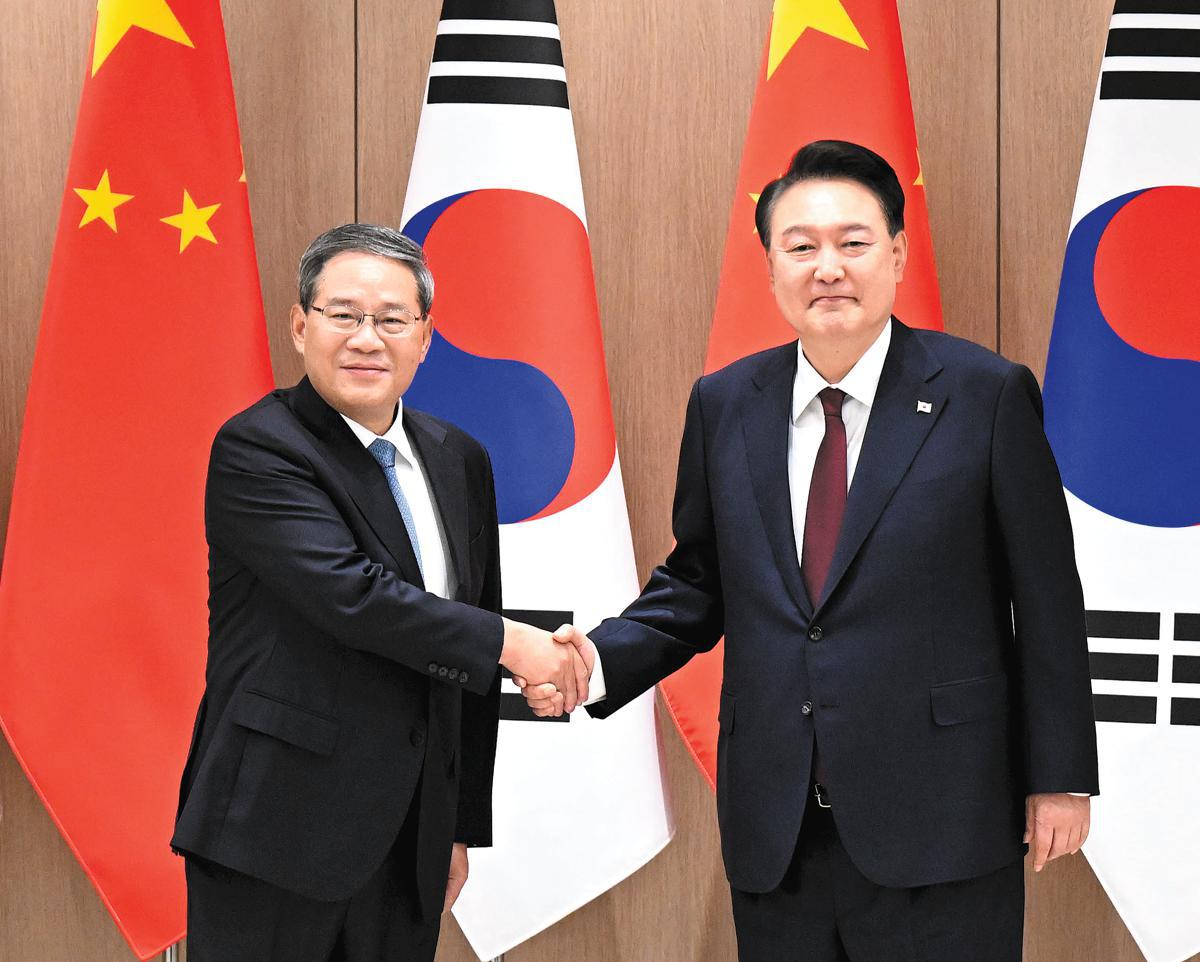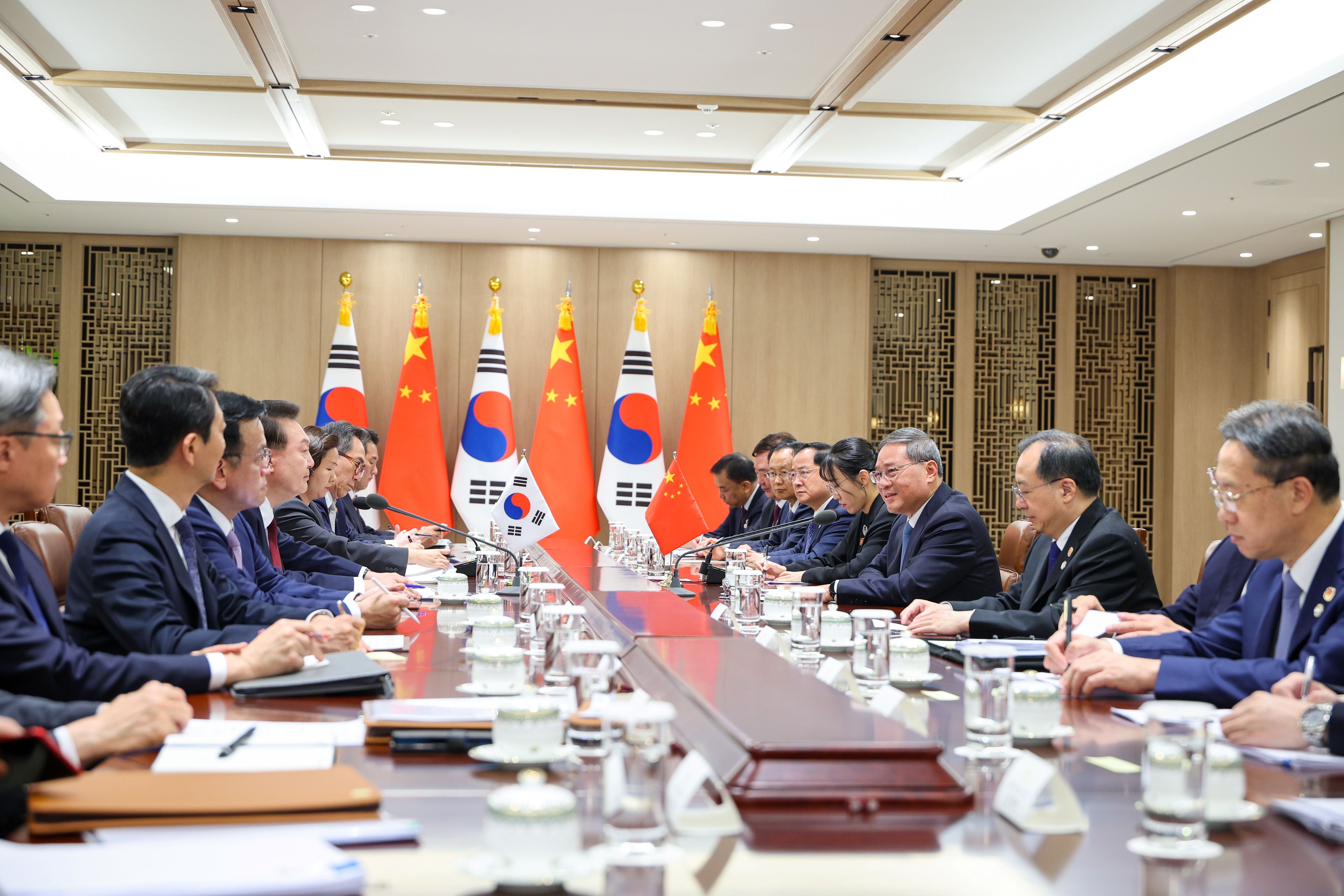
China and the Republic of Korea have agreed to start high-level strategic dialogue between their foreign ministries and expedite the second phase of negotiations on a bilateral free trade agreement amid their strained relations in recent years.
The decision was made on Sunday when Premier Li Qiang met with ROK President Yoon Suk-yeol in Seoul ahead of the ninth Trilateral Summit Meeting among China, Japan and the ROK, which is scheduled for Monday.
Both sides also agreed to hold "2+2" dialogues on foreign affairs and security at deputy ministerial level, and initiate the "track 1.5" dialogue and exchange mechanism. "Track 1.5" dialogues are talks that involve a delegation of government officials, who participate in an unofficial capacity, and nongovernmental experts — all sitting around the same table.
During the meeting, Li Liang called on the ROK to work with China to respect each other's core interests and major concerns and stay committed to being neighbors who trust each other and partners who help each other to succeed
The two countries pledged to better leverage mechanisms such as the economic ministers' meeting as well as consultations on industrial investment cooperation, industrial and supply chain collaboration and export control, revive the China-ROK Joint Committee on People-to-People Exchanges and youth exchanges, and further facilitate people-to-people exchanges between the two countries.
READ MORE: China-Japan-ROK summit expected to refocus on cooperation
During the meeting, Li called on the ROK to work with China to respect each other's core interests and major concerns and stay committed to being neighbors who trust each other and partners who help each other to succeed.
He said the industrial and supply chains of China and the ROK are deeply intertwined, with a solid foundation and enormous potential for economic and trade cooperation.
While calling for expanding cooperation in more fields, Li underscored the need for both countries to jointly resist politicizing economic and trade issues, or overstretching the concept of security, to maintain stable and unimpeded industrial and supply chains.
China is willing to accelerate the second phase of negotiations on the bilateral FTA based on a pragmatic and balanced approach, advance the construction of the China-ROK (Changchun) International Cooperation Demonstration Zone, and strengthen partnership in the fields of high-end manufacturing, new energy, artificial intelligence and biomedicine, the premier said.
ALSO READ: China, ROK to accelerate second phase of FTA negotiations
He pledged that China will further expand market access, enhance service guarantees for foreign investment, continuously foster a world-class, market-based business environment governed by a sound legal framework, and welcome more ROK companies to invest and do business in the country.

China is willing to enhance communication and coordination with the ROK in multilateral fields to jointly promote regional and global peace and development, Li added.
Yoon Suk-yeol assured Li that the ROK adheres to the one-China principle, a stance that remains unchanged, and will continue to steadfastly develop its relations with China
With the United States imposing restrictions to hinder China's development, there has been a negative trend among its allies to overstretch the concept of security in the fields of economics, trade and technology.
As a staunch ally of the US in Northeast Asia, the ROK has also adopted negative foreign policies toward China such as implementing export controls.
However, China has been the ROK's largest trading partner for 20 years in a row. Despite a year-on-year decrease of 13.5 percent, bilateral trade reached more than $310 billion in 2023, according to statistics from the General Administration of Customs.
Yoon said that maintaining close cooperation between the ROK and China is not only important for the development of both countries, but also significant for achieving global peace and prosperity.
READ MORE: China, ROK foreign ministers meet
He assured Li that the ROK adheres to the one-China principle, a stance that remains unchanged, and will continue to steadfastly develop its relations with China.
The ROK is willing to maintain high-level exchanges and close communication at all levels with China on the basis of mutual respect, expand economic and trade cooperation, enhance cultural exchanges, and broaden common interests between the two countries, Yoon said.
He added that Seoul is ready to deepen trilateral cooperation among the ROK, China and Japan.
On Sunday, Li also met with Lee Jae-yong, chairman of Samsung Electronics, in Seoul. He welcomed Samsung and other ROK companies to continue expanding their investment in and cooperation with China, and share more of the new opportunities brought about by China's development.


